九年级英语全册Unit6Whenwasitinvented知识讲解及练习素材新版人教新目标版2
九年级英语全册 Unit 6 When was it invented知识点汇总 (新版)人教新目标版
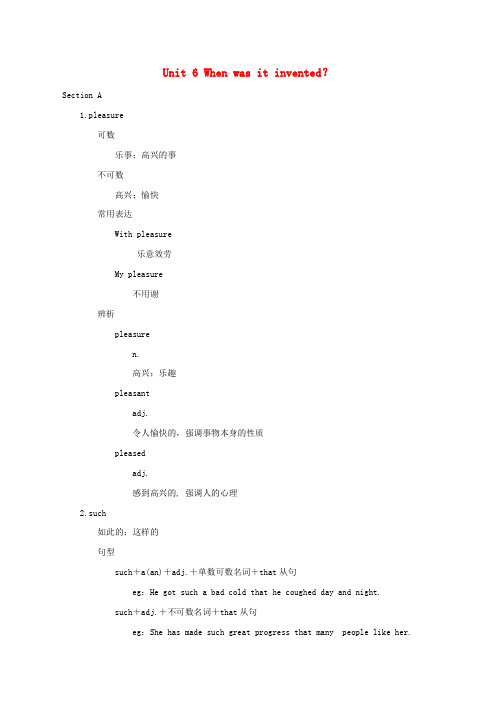
Unit 6 When was it invented?Section A1.pleasure可数乐事;高兴的事不可数高兴;愉快常用表达With pleasure乐意效劳My pleasure不用谢辨析pleasuren.高兴;乐趣pleasantadj.令人愉快的,强调事物本身的性质pleasedadj.感到高兴的, 强调人的心理2.such如此的;这样的句型such+a(an)+adj.+单数可数名词+that从句eg:He got such a bad cold that he coughed day and night.such+adj.+不可数名词+that从句eg:She has made such great progress that many people like her.such+adj.+名词复数+that从句eg:They are such interesting books that we all like them.辨析such修饰名词He is such a kind man.so修饰形容词或副词He is so kind a man.3.daily=every dayn.日报People's Daily《人民日报》4.mention提到;说到句型Don't mention it感谢道歉mention sb./sth.(to sb.)(向某人)提起某人或某事mention doing sth.提到做某事5.It is said that...据说……=People say that...相同结构It is reported that...据报道……It is supposed that...据猜测……It is believed that...人们认为……It's known that...众所周知……6.辨析take place指事先安排的事情eg: Great changes have taken place in our city over the years.happen指偶然发生的事情eg:An accident happened in that street.7.doubtwithout doubt毫无疑问;的确doubt sth.怀疑某事eg:No one doubts his ability.8.at a low price以低价eg:This sweater is on sale at a low price.9.translate翻译translate... into ...把……翻译成……eg:Don't translate everything into Chinese when you read English articles. Section B1.by mistake错误地;无意中eg:I took your bag by mistake.2.the Olympics=the Olympic Games语动词常用复数形式eg:The 30th Olympics were heldin London in 2012.3.divide...into把……分成……eg: The teacher divided us into four teams.4.stop句型stop ...from ...阻止……做某事eg: Nothing can stop China from being stronger and stronger.stop sb. from doing sth.= prevent sb. from doing sth.=keep sb. from doing sth.eg:Can you stop kids from playing Glory of Kings ?5.就近原则not only ... but also...neither...nor..既不……也不…… (两者都不)either...or...不是……就是……there be 结构6.look up to钦佩;仰慕=admireeg: Lots of kids look up to Li Yifeng nowadays.仰起头看……eg: The girl is so short that she has to look up to her elder sister.7.hero复数:+es以o结尾加es变复数的名词黑人(Negro) 英雄(hero)爱吃西红柿 (tomato) 炒土豆(potato) Section A1.pleasure可数乐事;高兴的事不可数高兴;愉快常用表达With pleasure乐意效劳My pleasure不用谢辨析pleasuren.高兴;乐趣pleasantadj.令人愉快的,强调事物本身的性质pleasedadj.感到高兴的, 强调人的心理2.such如此的;这样的句型such+a(an)+adj.+单数可数名词+that从句eg:He got such a bad cold that he coughed day and night.such+adj.+不可数名词+that从句eg:She has made such great progress that many people like her.such+adj.+名词复数+that从句eg:They are such interesting books that we all like them.辨析such修饰名词He is such a kind man.so修饰形容词或副词He is so kind a man.3.daily=every dayn.日报People's Daily《人民日报》4.mention提到;说到句型Don't mention it感谢道歉mention sb./sth.(to sb.)(向某人)提起某人或某事mention doing sth.提到做某事5.It is said that...据说……=People say that...相同结构It is reported that...据报道……It is supposed that...据猜测……It is believed that...人们认为……It's known that...众所周知……6.辨析take place指事先安排的事情eg: Great changes have taken place in our city over the years.happen指偶然发生的事情eg:An accident happened in that street.7.doubtwithout doubt毫无疑问;的确doubt sth.怀疑某事eg:No one doubts his ability.8.at a low price以低价eg:This sweater is on sale at a low price.9.translate翻译translate... into ...把……翻译成……eg:Don't translate everything into Chinese when you read English articles. Section B1.by mistake错误地;无意中eg:I took your bag by mistake.2.the Olympics=the Olympic Games语动词常用复数形式eg:The 30th Olympics were heldin London in 2012.3.divide...into把……分成……eg: The teacher divided us into four teams.4.stop句型stop ...from ...阻止……做某事eg: Nothing can stop China from being stronger and stronger.stop sb. from doing sth.= prevent sb. from doing sth.=keep sb. from doing sth.eg:Can you stop kids from playing Glory of Kings ?5.就近原则not only ... but also...neither...nor..既不……也不…… (两者都不)either...or...不是……就是……there be 结构6.look up to钦佩;仰慕=admireeg: Lots of kids look up to Li Yifeng nowadays.仰起头看……eg: The girl is so short that she has to look up to her elder sister.7.hero复数:+es以o结尾加es变复数的名词黑人(Negro) 英雄(hero)爱吃西红柿 (tomato) 炒土豆(potato)。
九年级英语全册Unit6Whenwasitinvented知识点总结(超全)(带答案)

九年级英语全册Unit6Whenwasitinvented知识点总结(超全)单选题1、The hat is not the right ________ for me. I’d like a smaller one.A.sizeB.styleC.colourD.material答案:A句意:这顶帽子大小不适合我。
我想要小一点的。
考查名词辨析。
size大小,尺寸;style款式;colour颜色;material材料。
根据“I’d like a smaller one”可知,是尺寸不合适,故选A。
2、—Where do you think ________?—I guess they took it in Suzhou.A.was the photo takenB.the photo was takenC.did the photo takeD.the photo took答案:B句意:——你认为照片是在哪里拍的?——我想他们是在苏州拍的。
考查宾语从句。
本题动词“think”后跟宾语从句,从句用陈述句语序,故排除A、C;从句主语“the photo”与谓语动词“take”之间是被动关系,因此用被动语态,故选B。
3、— Look, Cindy. The flowers in our classroom come out in one night.— That's fantastic! They are beautiful and colorful. They________ nice. A.smellsB.smellC.soundsD.sound答案:B句意:——听着,辛迪。
我们教室里的花一晚上就开花了。
——太棒了!它们美丽多彩。
它们闻起来很香。
考查动词辨析和主谓一致。
本句主语They复数,可知谓语动词使用原形,可知排除A和D。
花应是闻起来很香,smell:闻起来;sound:听起来。
故选B。
九年级英语全册Unit6Whenwasitinvented知识点讲解及练习素材人教新目标版(new)
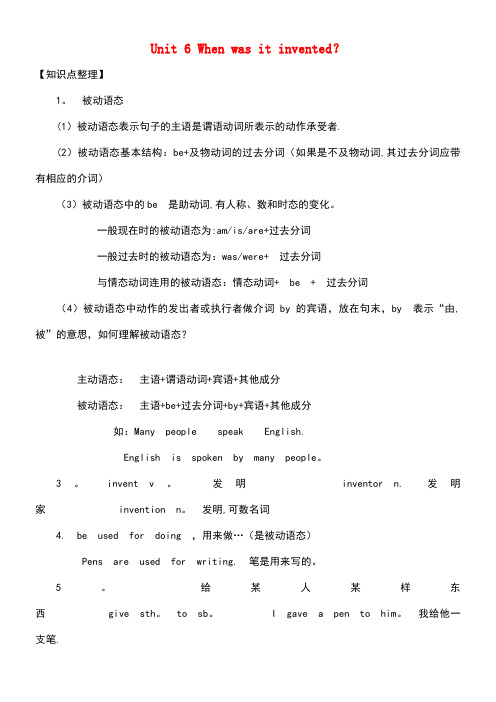
Unit 6 When was it invented?【知识点整理】1。
被动语态(1)被动语态表示句子的主语是谓语动词所表示的动作承受者.(2)被动语态基本结构:be+及物动词的过去分词(如果是不及物动词,其过去分词应带有相应的介词)(3)被动语态中的be 是助动词,有人称、数和时态的变化。
一般现在时的被动语态为:am/is/are+过去分词一般过去时的被动语态为:was/were+ 过去分词与情态动词连用的被动语态:情态动词+ be + 过去分词(4)被动语态中动作的发出者或执行者做介词by的宾语,放在句末,by 表示“由,被”的意思,如何理解被动语态?主动语态:主语+谓语动词+宾语+其他成分被动语态:主语+be+过去分词+by+宾语+其他成分如:Many people speak English.English is spoken by many people。
3。
invent v。
发明inventor n. 发明家invention n。
发明,可数名词4. be used for doing ,用来做…(是被动语态)Pens are used for writing. 笔是用来写的。
5。
给某人某样东西give sth。
to sb。
I gave a pen to him。
我给他一支笔.give sb. sth。
I gave him a pen。
我给他一支笔。
6。
all day 整天7。
salty adj。
咸的salt n. 盐8. by mistake 错误地(犯错是:make mistake,这些常见的短语大家务必要掌握)I took the umbrella by mistake. 我不小心拿错了雨伞。
9。
make sb./sth+形容词:使…怎么样It made me happy。
它使我高兴make sb./sth+名词:让…做…It made me laugh。
它让我发笑10. by accident 意外,偶然(常见短语,考的最多的是它的意思)I met her by accident at bus stop. 我在公共汽车站意外地见到了她。
九年级英语全册 Unit 6 When was it invented核心常考词汇详解素材 (新版)人教新目标版

Unit6核心常考词汇详解1.invent (v.)发明;创造invent指发明创造出自然界本来不存在的东西,如工具、方法、手段、汽车、电器、合成材料等。
【备课例句】Bell invented the telephone. 贝尔发明了电话。
Smith invented a new teaching method. 史密斯发明了一种新的教学方法。
【横向辐射】discover, find, create1.discover是“发现”的意思,是指发现原来就有而一直没被发现,如发现电、煤、石油等矿藏及新星、星系或科学真理等。
Columbus discovered America in 1492.1492年哥伦布发现了新大陆。
Recently they have discovered a comet. 最近他们发现了一颗彗星。
2.find的意思是“寻找”,强调找的结果,并不指发现。
I've tried to find another copy but couldn't find one. 我试图再找一本,但没能弄到。
3.create指有目的地把原材料制成新产品,也指创造出原来不存在的或与众不同的事物。
Man creates himself. 人类创造了自己。
A novelist creates characters and a plot. 小说家塑造人物并设计情节。
【课堂变式】根据语境提示,用invent, discover,find或create的形式填空,完成句子。
1.When _____ the stream engine(蒸汽机) ___?2. I can’t ____ my bike, I’m looking for it.3. Scientists are now trying to ___ if this is possible.4. Do you know who______ the plane?5. He ____quite a number of wonderful characters in his play.【解析】I.1.was, invented 2.find 3.discover 4.invented 5. created2. be used for 用来做……此短语中的for是介词,表示用途,后接名词或动词-ing形式。
九年级英语全册 Unit 6 When was it invented重点总结(短语+句型+作文)素材 (新版)人教新目标版
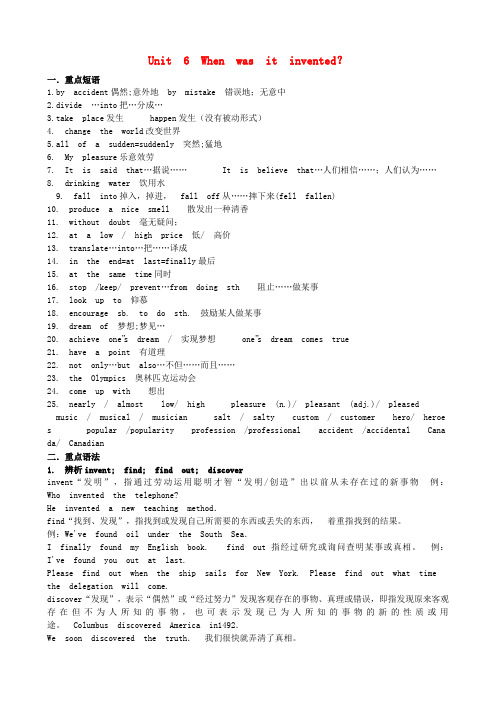
Unit 6 When was it invented?一.重点短语1.by accident偶然;意外地by mistake 错误地;无意中2.divide …into把…分成…3.take place发生happen发生(没有被动形式)4. change the world改变世界5.all of a sudden=suddenly 突然;猛地6. My pleasure乐意效劳7. It is said that…据说……It is believe that…人们相信……;人们认为……8. drinking water 饮用水9. fall into掉入,掉进,fall off从……摔下来(fell fallen)10. produce a nice smell 散发出一种清香11. without doubt 毫无疑问;12. at a low / high price 低/ 高价13. translate…into…把……译成14. in the end=at last=finally最后15. at the same time同时16. stop /keep/ prevent…from doing sth 阻止……做某事17. look up to 仰慕18. encourage sb. to do sth. 鼓励某人做某事19. dream of 梦想;梦见…20. achieve one‟s dream / 实现梦想one‟s dream comes true21. have a point 有道理22. not only…but also…不但……而且……23. the Olympics 奥林匹克运动会24. come up with 想出25. nearly / almost low/ high pleasure (n.)/ pleasant (adj.)/ pleasedmusic / musical / musician salt / salty custom / customer hero/ heroe s popular /popularity profession /professional accident /accidental Cana da/ Canadian二.重点语法1. 辨析invent; find; find out; discoverinvent“发明”,指通过劳动运用聪明才智“发明/创造”出以前从未存在过的新事物例:Who invented the telephone?He invented a new teaching method.find“找到、发现”,指找到或发现自己所需要的东西或丢失的东西,着重指找到的结果。
人教版英语九年级Unit6 When was it invented?全单元知识点讲解
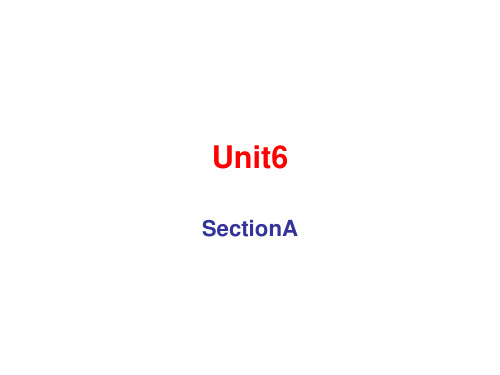
The teacher came in with a smile on
his face.
面带微笑
• project n.项目;工程
• pleasure n.高兴;愉快 eg:Reading gives me much pleasure.
常用短语:My pleasure./It's a /my pleasure./With pleasure.(很乐意/荣幸)
注意:Don't mention it. 用于口语,主要来 回答感谢,有时也用来回答道歉。
➢---Thank you very much. ---Don't mention it.不客气/不要这样说
➢---I'm sorry to trouble you. ---Don't mention it.没关系
daily English=daily English日常英语 adv.每天;每日=every day 作状语
eg:He comes here daily/every day. 拓展:daily n.日报
People's Daily《人民日报》 China Daily 类似的词:weekly adj.每周的 adv.一周一次
2.Well,you do seem to have a point... “do (does, did) + 动词原形”表示强调。 意为“确实;务必;一定;的确”。
eg:He d__o_e_s_come from America. 他的确来自美国。
I _d_i_d__call you yeaterday. 昨天我确实给你打电话了。
• pioneer n.先锋;先驱 China Young Pioneers中国少年先锋队
人教版英语九年级全册Unit 6知识点详解及练习

Unit6 When was it invented?1. invent /ɪn'vent/ vt.发明;创造辨析:discover与invent选词填空:discover与invent(1) Edison __________ the electric light bulb.(2) Franklin ___________ electricity.参考答案:invented; discovered2. please /pli:z/ v. 取悦(1) I’m pleased __________ (meet) you.(2) --Thank you for supporting the volunteer project.--________. Many hands make light work.A. My pleasureB. All rightC. Never mindD. That’s right 参考答案: (1) to meet; (2) A3. divide /dɪˈvaid/ vt. 划分;分离;使产生分歧(1) The cake ______ (divide) four parts for us to share.(2) 翻译:锻炼对身体的好处可以分成3个方面。
______________________________________________________________参考答案:1. is divided into2. The physical benefits of exercise can be divided into three factors.4. by mistake 错误地;无意中选词填空:mistake与by mistakeYesterday I _________ Mr. Wang _______ Mr. Zhang, and said hello to Mr. Wang ___________ (错误地).参考答案:mistook, for, by mistake;5. use/ˈjuːz / v. 使用;利用n. 用途;使用(1)—How does Jack usually go to work?—He ______ drive a car, but now he ______ there to lose weight.A. used to; is used to walkB. was used to; is used to walkingC. was used to; is used to walkD. used to; is used to walking(2) She ____ live alone. But she _____ living alone because she feels lonely.A. used to; doesn’t used toB. is used to; was used toC. used to; is not used toD. was used to; doesn’t used to参考答案:(1) D; (2) C6. by accident 偶然地(1) The police found the lost car_____A. with mistakeB. by accidentC. by mistakeD. in accident(2) She found her keys _____ when she cleaned her room after she lost them twoweeks ago.A. with mistakeB. in this wayC. by accidentD. with pleasure 参考答案:(1) B; (2) C7.take place 发生辨析take place与happen(1) The Olympic Games of 2016 _____ in Brazil.A. take afterB. took placeC. take placeD. take away(2) An accident ____ at the school gate this morning.A. happened B .happened to C. took place D. took places 参考答案:(1) B; (2) A8. create /kriˈeɪt/ v. 创造;翻译:浴室完全是由我设计的。
九年级英语全册Unit6Whenwasitinvented知识讲解及练习素材
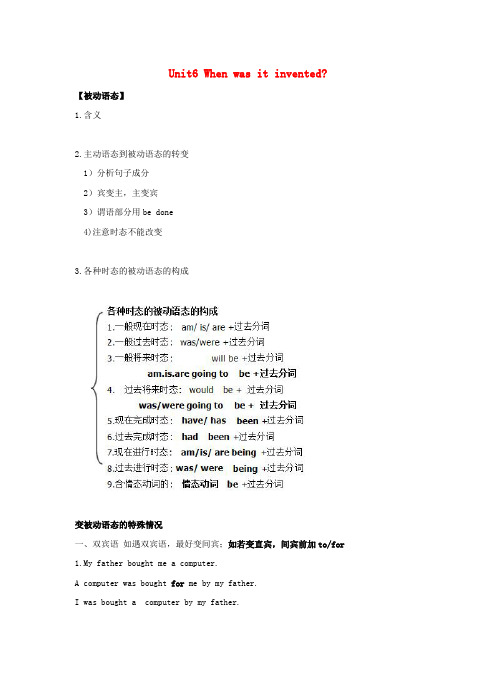
Unit6 When was it invented? 【被动语态】1.含义2.主动语态到被动语态的转变1)分析句子成分2)宾变主,主变宾3)谓语部分用be done4)注意时态不能改变3.各种时态的被动语态的构成变被动语态的特殊情况一、双宾语如遇双宾语,最好变间宾;如若变直宾,间宾前加to/for1.My father bought me a computer.A computer was bought for me by my father.I was bought a computer by my father.2.He gives me a book.A book is given to me by him.I am given a book by him二、无to不定式变为被动时加上to 感官动词真奇怪,被动语态to回来。
We often see him play basketball.He is often seen to play basketball by us.The boss made the children work for long.The children were made to work for long by the boss.三、注意动词短语的完整性take care of/look after/listen to/speak toThe old should be spoken to politely.The baby is taken good care of by the nurse四、不及物动词及系动词无被动语态happen /take place/ die/ rise /come true/ come out/run out被动语态练习一、将下列句子变为被动语态,每空一词。
1.We can finish the work in two days.The work _____ _____ _____ in two days.2.They produce silk in Suzhou.Silk ____ ______ in Suzhou.3.The children will sing an English song.An English song ____ ____ ___ by the children.4.I have given this book to the library.This book ___ ____ ____ to the library.5.Did they build a bridge here a year ago?____ a bridge ____ here by them a year ago?6.We'll put on an English play in our school.An English play ____ ____ _____ on in our school.7.More and more farmers buy color TV sets.Color TV sets ___ ___ ___ more and more farmers.8.We must water the flowers every day.The flowers must ___ ___ (by us) every day.9.They use knives for cutting things.Knives ___ ___ for cutting things.10.You can dig a hole in the earth.A Hole ____ ____ _____ in the earth.二、用动词的正确语态填空。
人教新目标英语九年级全册 Unit 6 When was it invented 语法精讲
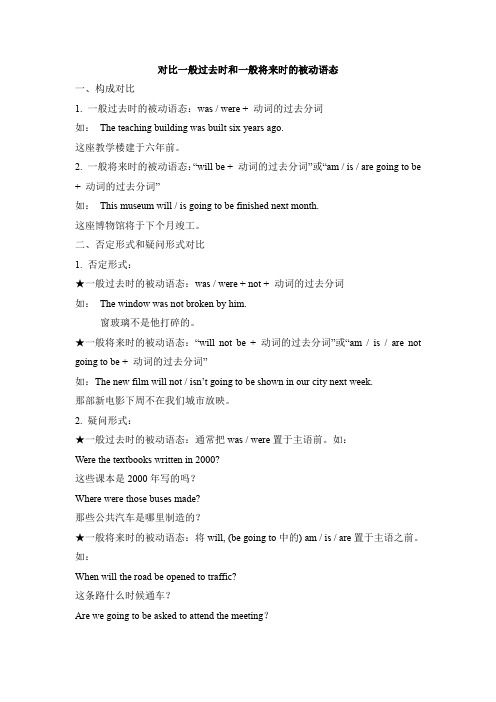
对比一般过去时和一般将来时的被动语态一、构成对比1. 一般过去时的被动语态:was / were + 动词的过去分词如:The teaching building was built six years ago.这座教学楼建于六年前。
2. 一般将来时的被动语态:“will be + 动词的过去分词”或“am / is / are going to be + 动词的过去分词”如:This museum will / is going to be finished next month.这座博物馆将于下个月竣工。
二、否定形式和疑问形式对比1. 否定形式:★一般过去时的被动语态:was / were + not + 动词的过去分词如:The window was not broken by him.窗玻璃不是他打碎的。
★一般将来时的被动语态:“will not be + 动词的过去分词”或“am / is / are not going to be + 动词的过去分词”如:The new film will not / isn’t going to be show n in our city next week.那部新电影下周不在我们城市放映。
2. 疑问形式:★一般过去时的被动语态:通常把was / were置于主语前。
如:Were the textbooks written in 2000?这些课本是2000年写的吗?Where were those buses made?那些公共汽车是哪里制造的?★一般将来时的被动语态:将will, (be going to中的) am / is / are置于主语之前。
如:When will the road be opened to traffic?这条路什么时候通车?Are we going to be asked to attend the meeting?我们会被邀请参加会议吗?【趁热打铁】Ⅰ. 请选出能填入空白处的最佳选项。
九年级英语全册 Unit 6 When was it invented知识点总结 人教版
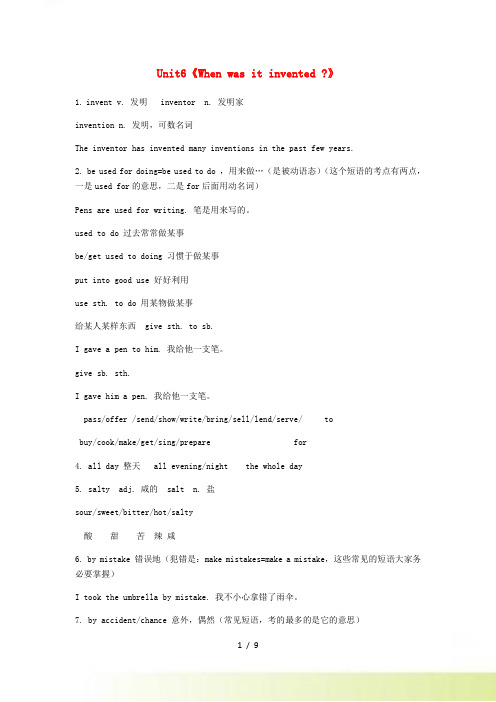
Unit6《When was it invented ?》1.invent v. 发明 inventor n. 发明家invention n. 发明,可数名词The inventor has invented many inventions in the past few years.2. be used for doing=be used to do ,用来做…(是被动语态)(这个短语的考点有两点,一是used for的意思,二是for后面用动名词)Pens are used for writing. 笔是用来写的。
used to do 过去常常做某事be/get used to doing 习惯于做某事put into good use 好好利用use sth. to do 用某物做某事给某人某样东西 give sth. to sb.I gave a pen to him. 我给他一支笔。
give sb. sth.I gave him a pen. 我给他一支笔。
pass/offer /send/show/write/bring/sell/lend/serve/ tobuy/cook/make/get/sing/prepare for4. all day 整天 all evening/night the whole day5. salty adj. 咸的 salt n. 盐sour/sweet/bitter/hot/salty酸甜苦辣咸6. by mistake 错误地(犯错是:make mistakes=make a mistake,这些常见的短语大家务必要掌握)I took the umbrella by mistake. 我不小心拿错了雨伞。
7. by accident/chance 意外,偶然(常见短语,考的最多的是它的意思)I met her by accident at bus stop.我在公共汽车站意外地见到了她。
增城市第一中学九年级英语全册 Unit 6 When was it invented知识点归纳及习题
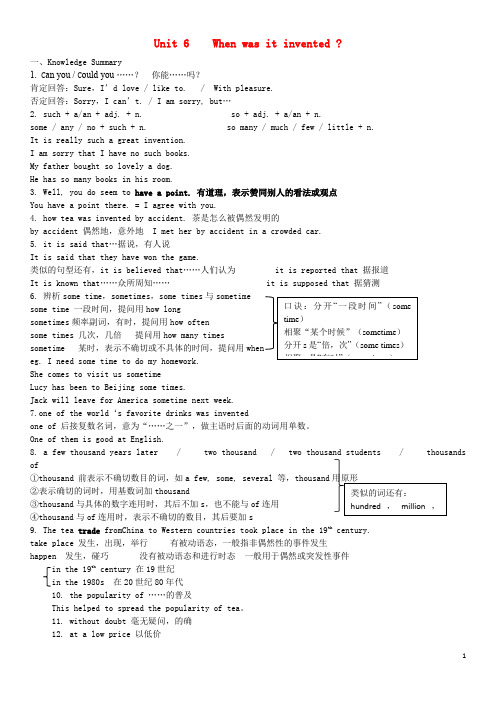
Unit 6 When was it invented ?一、Knowledge Summary1. C an you / C ould you ……?你能……吗?肯定回答:Sure,I’d love / like to. / With pleasure.否定回答:Sorry,I can’t. / I am sorry, but…2. such + a/an + adj. + n. so + adj. + a/an + n.some / any / no + such + n. so many / much / few / little + n.It is really such a great invention.I am sorry that I have no such books.My father bought so lovely a dog.He has so many books in his room.3. Well, you do seem to have a point. 有道理,表示赞同别人的看法或观点You have a point there. = I agree with you.4. how tea was invented by accident. 茶是怎么被偶然发明的by accident 偶然地,意外地 I met her by accident in a crowded car.5. it is said that…据说,有人说It is said that they have won the game.类似的句型还有,it is believed t hat……人们认为 it is reported that 据报道It is known that……众所周知…… it is supposed that 据猜测6. 辨析some time,sometimes,some times与sometimesometimes频率副词,有时,提问用how oftensome times 几次,几倍提问用how many timessometime 某时,表示不确切或不具体的时间,提问用eg. I need some time to do my homework.She comes to visit us sometimeLucy has been to Beijing some times.Jack will leave for America sometime next week.7.one of the world‘s favorite drinks was inventedone of 后接复数名词,意为“……之一”,做主语时后面的动词用单数。
九年级英语全册必考话题作文Unit6Whenwasitinvented素材

Unit6 When was it invented?本单元的话题是“发明”,涉及科普知识与技术等内容,是学生最感兴趣的话题之一。
写作体裁多为说明文,写好这类文章一定要抓住事物的特征、功能和用途。
写作此类话题作文的常用表达有:(1) When was …invented?(2) It was invented…(3) They are used for…【典型例题】计算机在我们的生活、工作中的作用越来越大,你知道计算机的起源与发展吗?请结合计算机的发明时间(1946年)、外形、用途等方面,谈一下它的发展变化,并说明你对未来计算机的畅想。
【优秀范文】ComputerComputers are becoming more and more important in our daily life. Do you know when the computer was invented?The computer was invented in 1946. At that time, it was huge. With the development of science and technology, the computer has grown smaller. Now there are many kinds of computers, such as personal computers and laptops. The computer is a very useful tool in our life. For example, it can send some messages to foreign friends by email. What’s more, it ca n share information with others through the World Wide Web. We can also listen to music or play the game on computers. It makes us relax.It’s hard to imagine what our life would be like without computers. I think computers will be more convenient and they are going to change our life completely in the near future.。
九年级英语全册Unit6Whenwasitinvented知识点归纳总结(精华版)(带答案)

九年级英语全册Unit6Whenwasitinvented知识点归纳总结(精华版)单选题1、The fish you bought yesterday smells ________. You’d better throw it away. A.goodB.badC.wellD.badly答案:B句意:你昨天买的鱼闻起来坏了,你最好把它扔掉。
good意为“好”,是形容词, bad 意为“坏的”,是形容词,well意为“好”,是副词,badly意为“坏地”,是副词。
smells意为“闻起来”,是系动词,后接形容词作表语。
根据You’d better throw it away.可知,故选B项。
2、Another bridge over the Jialing River________last year.A.buildsB.builtC.is builtD.was built答案:D句意:去年在嘉陵江上又建了一座桥。
考查动词的时态和被动语态。
builds动词第三人称单数形式,修建;built是build的过去式或过去分词形式;is built是一般现在时的被动语态;was built是一般过去时的被动语态。
根据句意可知,该句的主语Another bridge与动词构成被动关系,应用被动语态,排除A和B;再由句中的时间last year可知,应用一般过去时。
故选D。
3、Last year Huai'an Flyover(高架) _________. Now it brings much convenience to people. A.finishedB.finishesC.is finishingD.was finished答案:D句意:去年淮安高架建成。
现在它给人们带来了很多便利。
考查动词的时态。
finished完成,动词的过去式;finishes动词的一般现在时的第三人称单数;is finishing动词的现在进行时;was finished动词的一般过去时态的被动。
- 1、下载文档前请自行甄别文档内容的完整性,平台不提供额外的编辑、内容补充、找答案等附加服务。
- 2、"仅部分预览"的文档,不可在线预览部分如存在完整性等问题,可反馈申请退款(可完整预览的文档不适用该条件!)。
- 3、如文档侵犯您的权益,请联系客服反馈,我们会尽快为您处理(人工客服工作时间:9:00-18:30)。
Unit6 When was it invented? 【被动语态】1.含义2.主动语态到被动语态的转变1)分析句子成分2)宾变主,主变宾3)谓语部分用be done4)注意时态不能改变3.各种时态的被动语态的构成变被动语态的特殊情况一、双宾语如遇双宾语,最好变间宾;如若变直宾,间宾前加to/for1.My father bought me a computer.A computer was bought for me by my father.I was bought a computer by my father.2.He gives me a book.A book is given to me by him.I am given a book by him二、无to不定式变为被动时加上to 感官动词真奇怪,被动语态to回来。
We often see him play basketball.He is often seen to play basketball by us.The boss made the children work for long.The children were made to work for long by the boss.三、注意动词短语的完整性take care of/look after/listen to/speak toThe old should be spoken to politely.The baby is taken good care of by the nurse四、不及物动词及系动词无被动语态happen /take place/ die/ rise /come true/ come out/run out被动语态练习一、将下列句子变为被动语态,每空一词。
1.We can finish the work in two days.The work _____ _____ _____ in two days.2.They produce silk in Suzhou.Silk ____ ______ in Suzhou.3.The children will sing an English song.An English song ____ ____ ___ by the children.4.I have given this book to the library.This book ___ ____ ____ to the library.5.Did they build a bridge here a year ago?____ a bridge ____ here by them a year ago?6.We'll put on an English play in our school.An English play ____ ____ _____ on in our school.7.More and more farmers buy color TV sets.Color TV sets ___ ___ ___ more and more farmers.8.We must water the flowers every day.The flowers must ___ ___ (by us) every day.9.They use knives for cutting things.Knives ___ ___ for cutting things.10.You can dig a hole in the earth.A Hole ____ ____ _____ in the earth.二、用动词的正确语态填空。
1.The students _____ often _____(tell) to take care of their desks and chairs.2.That play ________(put) on again sometime next month.3.The old man is ill. He ______ (must send) to the hospital.4.Vegetables, eggs and fruits_________ (sell) in this shop.5.What ___ a knife ______ (make) of?It _______________ (make) of metal and wood.6.A Piano concert _____________(give) here last Friday.7.______ the magazine ____(can take) out of the library?8.Russian _______ ______ (learn)as the second language by some students in China.9.The stars _____________ (can see) in the daytime.10. These kinds of machines __________(make) in Japan.三、将下列句子改为被动语态1.We use stamps for sending letters.2.Chinese speak English as a second language.3.Teachers should allow teenagers to wear their own clothes.4.Kate took good care of the baby yesterday evening.四、单项选择( )1.Pens are used for on paper.A.writeB.writingC.to writeD.wrote( )2.It was invented EdisonA.byB.inC.forD.to( )3.This watch China.A.was made inB.was made byC.was made fromD.was made of( )4.-- was the car invented? --It was invented in 1983.A.WhenB.WhyC.HowD.Who( )5.My mother told me that my homework must on time.A.finishB.be finishC.be finshedD.finished( )6.The box can a table.A.be used toB.be used byC.be used inD.be used as( )7.He is often heard playing the piano.A.practicingB.practiceC.practicesD.to practice( )8.—Your city looks beautiful! --Yes.Lots of trees and grass last year.A.are plantedB.have plantedC.were plantingD.were planted( )9.English is widely used travelers and business people all over the world.A.forB.toC.asD.by( )10.—What is mom cooking in the kitchen?--Chicken, I guess.How niceit !A.looksB.smellsC.soundsD.tastes【词汇】1、For example ,it mentioned that the zipper was invented by WJ in 1893 .1)分析本句的宾语从句2)invent v. 发明发明者2、Can you help me think of an invention ?-----My pleasure !1)think ofthink about2) my pleasurewith pleasure3、The zipper ? Is it really such a great invention ?1)分析such a great invention 与so 的区别4、Well,you do seem to have a point .这是一个强调谓语的句子用助动词do does did 来强调,译为“务必,一定,确实”翻译下列句子:1)一定要早点来!2)她上周确实送这件礼物给你3)Mary确实喜欢你5、Did you know that tea ,the most popular drink in the world ,was invented by accident ?1)分析宾语从句(语序)2)同位语:一个名词(或其他形式)对另一个名词进行修饰、限定、说明,这个名词就叫同位语例如:Mr .Smith ,our new teacher ,is very kind of us .He told me that his brother John is a famous doctor .3)accident 作为名词“意外的事情”“事故”短语:by accident6.It is said that a Chinese ruler called Shen Nong was the first to discover tea as a drink.It is believed that tea was brought to Korea and Japan during the 6th and 7th centuries.1)其中It is said that “据说” =People sayIt is believed that“人们相信” =People believe翻译:据报道2)believebelieve in7、Some leaves from a tea plant fell into the water and remained there for some time .1)fall into 相当于drop into2)some time 与之相似的各种形式8、 not ....until........until....例如:我一直工作到午夜。
